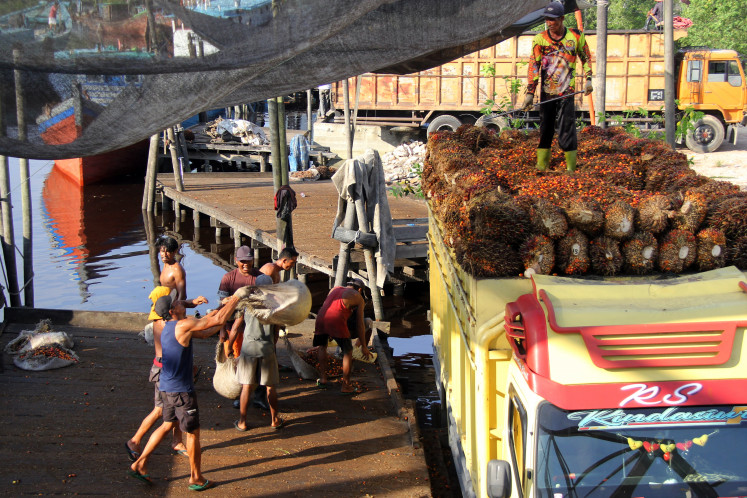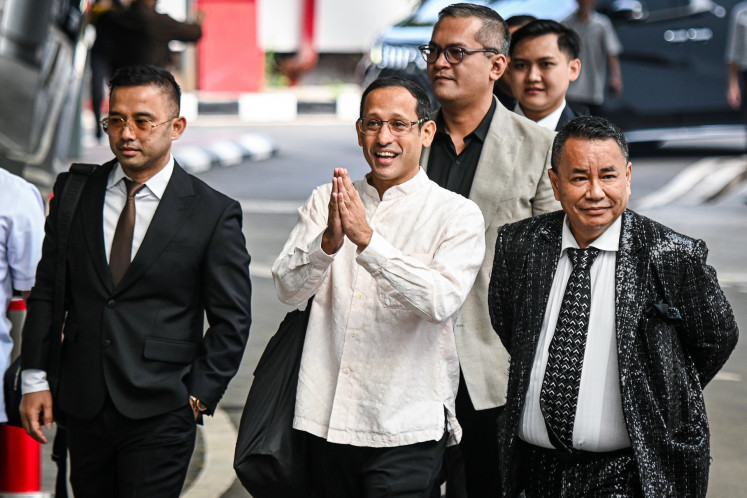Popular Reads
Top Results
Can't find what you're looking for?
View all search resultsPopular Reads
Top Results
Can't find what you're looking for?
View all search resultsWhy feminism in Indonesia is important
What is feminism? How does feminism fare in Indonesia? Does it contradict religious and cultural teachings in Indonesia? What impact does it have on Indonesian women?These questions keep cropping up every time the word feminism is uttered
Change text size
Gift Premium Articles
to Anyone
W
hat is feminism? How does feminism fare in Indonesia? Does it contradict religious and cultural teachings in Indonesia? What impact does it have on Indonesian women?
These questions keep cropping up every time the word feminism is uttered. In fact, many Indonesians, especially women, still believe that feminism destroys the traditional teachings of culture and religion, that it is a concept of the Western world hell-bent on corrupting Indonesian women and turn them against their men.
In reality, feminist values are alive and well, and have had an impact on the lives of Indonesian women regardless of whether the actors claim to be feminist or not.
Feminism can be traced back to the early 20th century, when Indonesian women were first given the opportunity to attend school. On Dec. 22, 1928, a group of women activists conducted their first ever conference, which later picked up on women’s rights issues, which included polygamous and child marriages, the right to divorce and the right to vote.
Among the women who advanced feminism were Kartini, hailed as being at the forefront of female reformists and nationalists; Rohana Koedoes, a journalist from West Sumatra; Dewi Sartika who spearheaded schooling for women in West Java; Maria Walanda Maramis who fought for the welfare of mothers and girls in North Sulawesi through education and Rangkayo Rasuna Said who was also active in West Sumatra.
What are Indonesian feminists fighting for? From the beginning and until now, Indonesian feminists have struggled to have the rights of women respected and upheld. We want women to have the same rights to education, health, legal access, economic opportunities, and moreover, to have the government recognize and create a space for women in the government’s decision-making process.
We want women to have a choice in terms of marriage and divorce, in terms of determining their health rights, to have equal access to education and health and to have the same access to economic opportunities. We want women to have a voice in government decisions, especially those concerning women and girls. We must have fair and equitable government policies.
However, the patriarchal culture of Indonesia has often derailed this fight. The Indonesian Women’s Movement of 1928
was reduced to a mere celebration of motherhood by the Soeharto regime.
Affirmative action for women in politics and government is reduced to mere token quotas for women legislative candidates — not mandatory quotas for legislative bodies — and in placing a smattering of women in government positions.
Somehow, the fight for women’s rights is widely domesticated and caged in the domestic responsibilities of being wives and daughters.
This is perpetuated by various religious leaders who twist the understanding or interpretation of religious teachings in such a way that women are seen as noble beings who must be protected and put in homes and not seen in public. They even go so far as saying that religious women are those who obey their husbands, and that feminism contradicts Islamic teachings.
That Indonesian women, especially Muslims, do not need feminism, because Islam has placed women in a very noble position, they presume.
This is a deeply malicious twist of the teachings of Islam. In principle, Islam sees all human beings as equal, as quoted in Surah (verse) Al-Hujarah, “O mankind, indeed We have created you from male and female and made you peoples and tribes that you may know one another.
Indeed, the most noble of you in the sight of Allah is the most righteous of you. […]”
Furthermore, Prophet Muhammad stated firmly, in Surah Al Najem, that, “People are equal, like teeth in a comb”. A hadith by Bukhari (Prophet’s saying) cites the Prophet Muhammad saying that Islam gave the rights of women the same as men in serving their religion, homeland, nation and state.
Surah Al-Mukmin states, “Whoso does an evil deed, shall be recompensed only with the like of it and whoso does good work whether male or female and be a Muslim, then they shall enter Paradise and they shall be provided therein without count”.
Clearly, Islam does not differentiate between the rights of women and men in religion. The only distinctions are related to biological conditions, such as child-bearing and nursing. Other than that, the rights and obligations of women and men are equal in the eyes of Islam.
However, there are many dubious religious teachings and practices that disregard equality, with gaps remaining in marriage, education, public participation, access to economic opportunities and rights.
We have seen far too much violence perpetrated by men and husbands against women and girls, sometimes in the name of religion.
We still see child brides, non-consensual polygamous marriages, women resorting to marriage rather than being ashamed of their status as widows, women being sexually harassed and attacked by men, women falling into poverty for lack of access to education and skills vital for their livelihood while being abandoned by their husbands. This is why, Indonesia still needs feminism.
Feminism in Indonesia is fighting to make sure that no women will be subjected to abuse or derogation simply because they are women due to a lack of education, lack of access to economic opportunities, lack of representation and public participation.
Thus, clearly feminism does not reject Islamic teachings. It does not contradict Islam, the major religion here. The only thing feminism rejects are efforts to make women worship men, by putting women “into gilded cages and on a pedestal”.
The only thing feminism rejects is derogation of women into mere objects in marriage, public spaces, government proceedings and other aspects of life.
Indonesian feminists still see the huge gap between ideal conditions and reality in the protection of women’s rights. This is why Indonesian feminists are fighting hard to make sure that the state protects the rights of women, with the latest effort in campaigning for the sexual violence bill.
This law will be another tool to bridge the gap between ideals and reality, as well as to ensure that the state actively protects Indonesian women.
____________________
The writers are members of the Jakarta Feminist Discussion Group.










